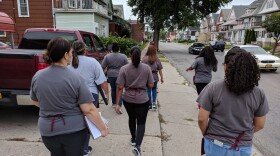On Thursday, WBFO airs the latest feature from Avery Schneider and the Health and Wellness News Desk. He spoke with Morning Host Jay Moran for a preview of the story on the Buffalo Prenatal-Perinatal Network's Community Health Worker Outreach Program.
Jay Moran: In the studio this morning, Avery Schneider, WBFO’s Lead Reporter for the Health and Wellness News Desk. Avery, welcome.
Avery Schneider: Thanks Jay. Good to be here.
JM: Alright Avery, so this story you’ve got coming out tomorrow is about a group that does door-to-door with outreach in Buffalo to help pregnant women living in poverty?
AS: Yeah, so this is a story about the Buffalo Prenatal Perinatal Network’s Community Health Worker Program. And, as you said, they go door-to-door. It’s typically on the East Side of Buffalo where health outcomes can be pretty poor. And they’re looking for people they can help with their services.
So they were kind enough to let me tag along on two of their outreach days to see what they do, explore the neighborhoods, and speak to real people.
JM: How’d it go?
AS: You know, it was challenging in some ways. It’s not often that you have to hang back as a reporter on a story. Usually you’re right up there with the subjects as they’re talking through the story. But in this case, the microphone can be a little bit intimidating and scare people off. And on top of that, the conversations that these Community Health Workers are having can be difficult to begin with. So it was important to make sure that my job didn’t interfere with their job. But they were really great about keeping me involved and helping make the introductions so that I could talk to those real people in the community.
JM: Okay, so I want to find out about a couple of different elements. I most certainly want to hear about these people in the community that you had a chance to talk to. But I’m also curious about the community health workers – these people that are involved. How did their experience impact their involvement here?
AS: Well, first off, it’s challenging work. It’s not an easy thing to go door-to-door. It takes a lot of motivation, especially because they’re not always successful on a given outreach day. They can go out and find no one, and some days they can go out and find a dozen people. It’s hit-or-miss, so they really have to keep a positive attitude while they do it.
The manager of the program – she told me how she was a teen mom living in poverty, living with a challenging family situation, and she worked hard, she became successful, and that informed her work. And it was at a time when this kind of thing didn’t exist to help her, or at least not that she had access to.
One of the other workers who’s on the staff told me how she wasn’t a teen mom, but when she was in high school scared, we’ll say, the daylights out of her and made her get on birth control. And that’s one of the other things this network offers. They provide birth control, they provide education. And now as she goes out and meets people door-to-door, she can share a little bit of her personal experience and say, ‘Hey, you know what, there’s something out there for you that can help.’
JM: Those are great stories unto themselves. Now what about these people that you had a chance to meet – what did you learn?
AS: Well, I don’t want to give everything away from the story tomorrow, because I want to make sure people tune in – it’s important. But some of what you may not hear in the story itself is that not everyone is comfortable admitting when they’re struggling. Talking to the people who run this outreach program – many of their clients don’t have food, furniture. Sometimes they don’t have a place to live. And they may not be coming home from a hospital with their baby with a crib or a bed for themselves. And sometimes these women are dealing with situations of abuse as well.
JM: So you’re saying that some of these women coming home, they don’t have food?
AS: That’s right. We all know that happens there, but not everybody thinks about it. Talking to the manager of this program, she told me people ask her, ‘How can you go hungry in Buffalo?’ She tells them it happens every day. There are people who are starving. And that’s just one of the issues her team goes the extra mile to address. While they’re out on an outreach day, if they find somebody who maybe hasn’t eaten for days, they’ll put their work on hold, they’ll take them to get a meal. I noticed that some of the outreach workers, they’re taking down signs, and phone numbers, and addresses when they see a ‘For Rent’ sign. So that way if they have a client who’s in need of housing, they’re putting that connection together. It’s one more way that they go a little further.
JM: You’ve really peaked my interest here. We’re going to hear the rest tomorrow?
AS: That’s right. You’ll hear what it’s like as they go door-to-door in Buffalo. There’s also going to be an extra story on our website, where you meet a woman that we ran into – by chance – who was in their program almost two decades ago, and it helped turn her life around. I’m really excited for our audience to tune in. I think it’s an important story to hear.
JM: It most certainly is an important story. Avery Schneider, from the WBFO Health and Wellness News Desk. Thanks very much and we’re looking forward to the story tomorrow.
AS: Thanks, Jay. Always a pleasure.






